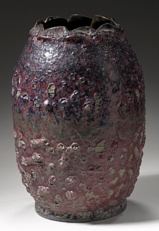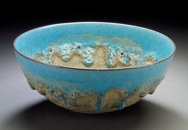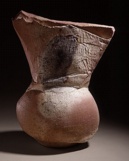
Also examples:

Japanese, middle Jomon period, c. 2500 BCE,
Flame Pattern Vessel, earthenware, 61
cm high, Cleveland Museum of Art.
Chinese, T'ang dynasty, Pair of Lokapala (heavenly guardians), c. 700-750 CE, earthenware with three-colored (sancai) lead glazes, each 40 7/8 x 16 1/2 x 11 3/4 inches (103.8 x 41.9 x 29.8 cm), Dallas Museum of Art.
![]()
Unknown Italian, Ecce Homo, Faenza or Florence, about
1500, tin-glazed earthenware, height 23 3/4 inches (60.3 cm),
J. Paul Getty Museum, Malibu, CA. See ecce
homo.

Francesco Xanto Avelli Da Rovigo (Italian,
Urbino, active 1528-45), Plate from the Pucci Service: ’Hero and Leander’, 1532, tin-glazed earthenware,
diameter 17 3/4 inches (45.1 cm), Los Angeles County Museum of
Art.
![]()
Girolamo della Robbia (Italian, 1488-1566),
Bust of a Man, France, about 1526 - 1535,
tin-glazed earthenware,
18 1/4 x 7 inches (46.4 x 16 cm), J. Paul Getty Museum, Malibu,
CA.

England, Lambeth, c. 1690, Pill Slab with the Arms of the Society of Apothecaries and the City of London, tin-glazed earthenware (Delftware), 10 5/8 x 9 5/8 inches (26.99 x 24.45 cm), Los Angeles County Museum of Art. See coat of arms.

England, 17th century, Charger of Charles II in the Boscobel Oak, c. 1685, lead-glazed earthenware with slip decoration, diameter 17 inches (43.2 cm), Los Angeles County Museum of Art.

George Edgar Ohr (American, 1857-1918),
Vase, c. 1888-1894, earthenware, height 7 1/4 inches (18.42 cm), diameter 4 7/8 inches (12.38 cm), Los Angeles County Museum of Art. See vase.

George Edgar Ohr / Biloxi Art Pottery (American, c. 1880 - c. 1909), Vase, c. 1895-1900,
earthenware, height 7 1/2 inches (19.05 cm), diameter 5 1/2 inches (13.97 cm), Los Angeles County Museum of Art.

George Ohr, Bowl, 1910, glazed earthenware, 3 5/8 x 6 3/8 inches, Minneapolis Institute of Arts.

Eva Zeisel (American, born Hungary, 1906-), designer; Schramberg Majolica Factory (Schramberg, Germany), manufacturer, Inkwell, 1929-30, glazed earthenware, 3 3/8 x 9 x 9 3/8 inches (8.6 x 22.9 x 23.8 cm), Metropolitan Museum of Art, NY.

Otto Natzler (Austrian, 1908-2007) , Gertrud Natzler (Austrian, 1908-1971),
Bowl, 1943, earthenware, turquoise overflow lava glaze, height 3 7/16 inches (8.75 cm), diameter 8 1/2 inches (21.5 cm), Los Angeles County Museum of Art. See Austrian art.

Paul Soldner (American, 1921-), Wasp-Waist Form, 1982, earthenware, 15 1/2 x 12 x 8 inches (39.4 x 30.5 x 20.3 cm), Los Angeles County Museum of Art.

Peter Voulkos (American, 1924-), Bowl with Inscribed Fish Design, 1957,
red glazed earthenware, 4 1/2 x 7 1/4 inches, Minneapolis Institute
of Arts.
Also see ceramics, lead glaze, porcelain, stoneware, and terra cotta.
https://inform.quest/_art
Copyright © 1996-![]()